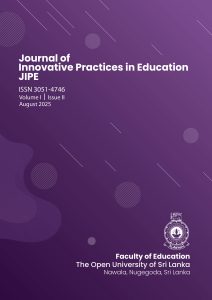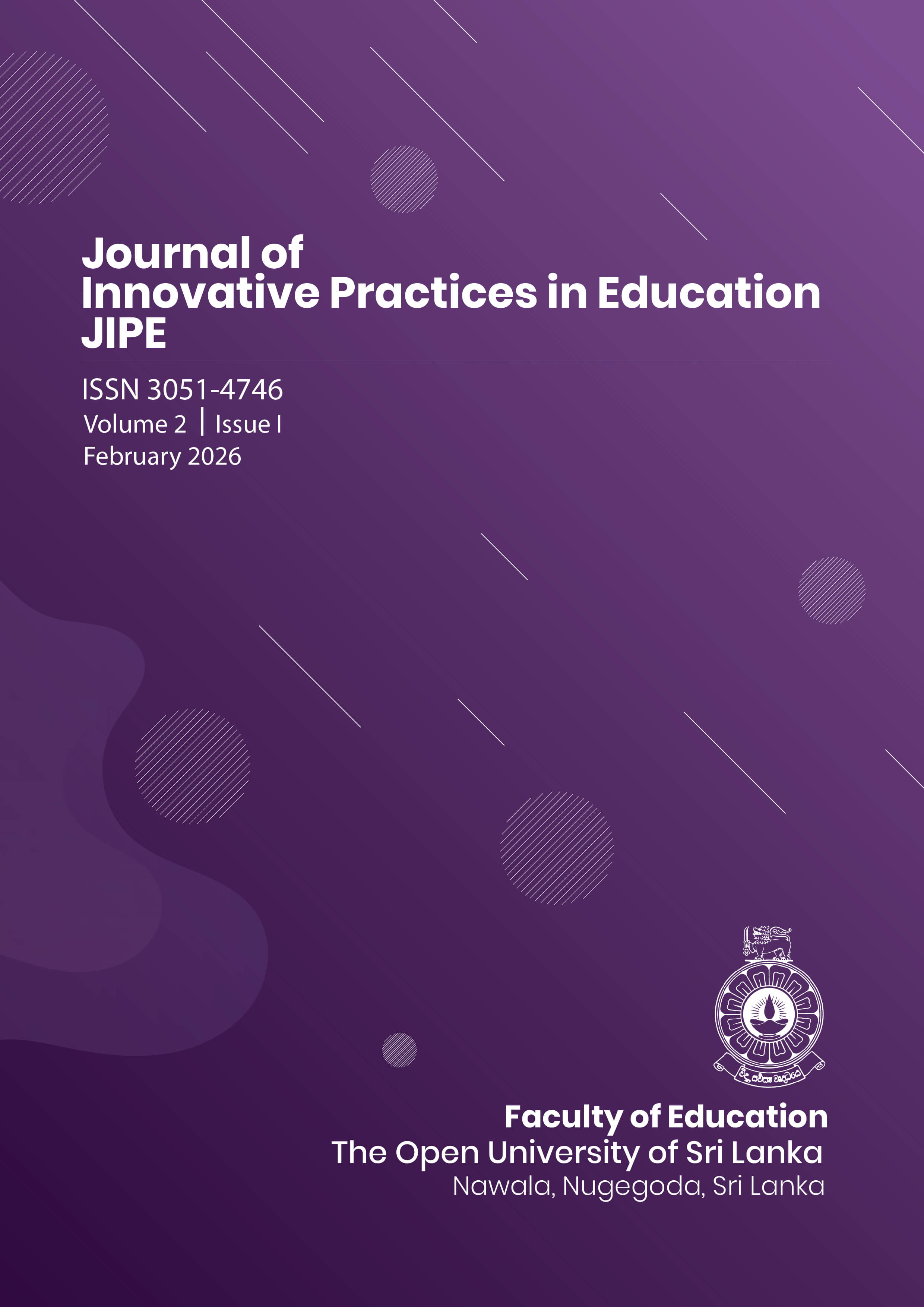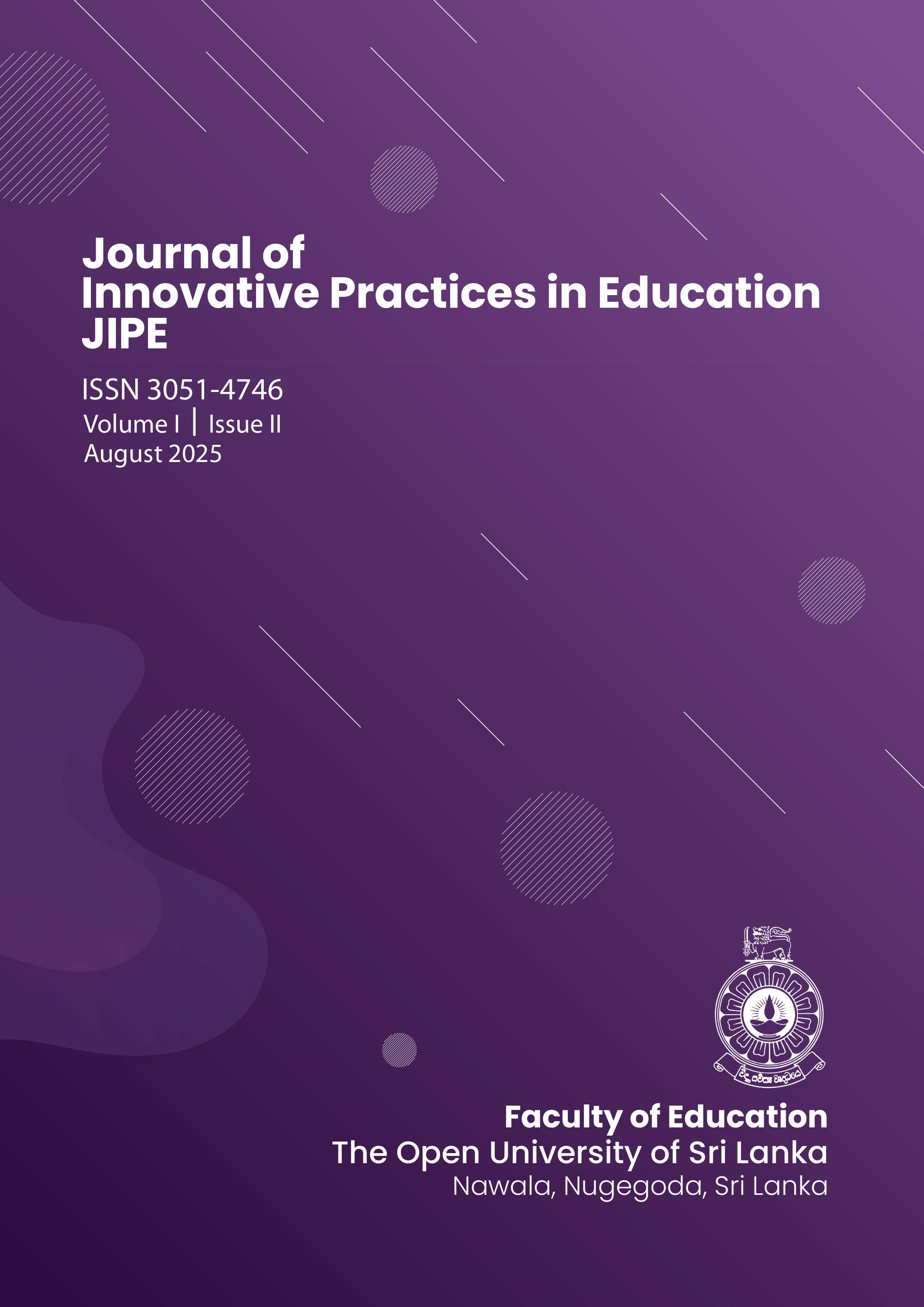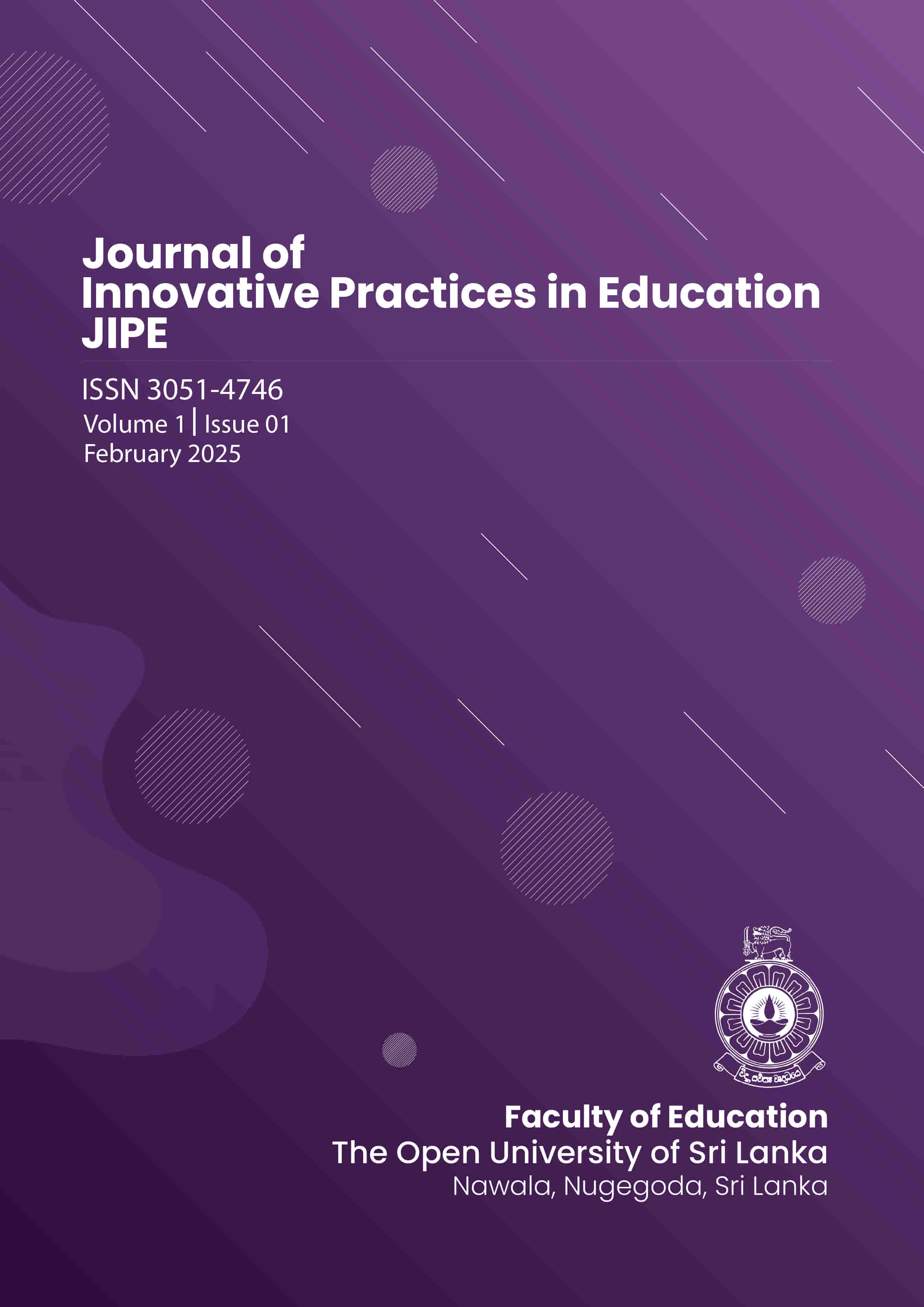
The Journal of Innovative Practices in Education (JIPE) is a tri-lingual, peer-reviewed, open-access, online research journal published by the Faculty of Education at the Open University of Sri Lanka (OUSL), since February 2025.
ISSN 3051-4746
Call for papers for JIPE is open now!
Please submit your manuscripts together with the other required documents to the online platform of “Sri Lanka Journals Online” (SLJOL), using the following link: https://jipe.sljol.info/
(NOTE: You must register in SLJOL before submitting manuscripts.)
Contact: Editor-in-Chief <edjipe@ou.ac.lk>
Focus and Scope
The Journal of Innovative Practices in Education (JIPE) serves as a platform for scholars, educators, practitioners, and researchers from any part of the world, to disseminate their research findings, share knowledge, and contribute to the advancement of education through publishing innovative research.
The aim of the journal is to promote teaching, research, and scholarship in the professional practice of education and educators.
The objectives of the journal are to:
* provide a platform for scholars to publish innovative research related to professional practice in education;
* promote interdisciplinary research in the field of education; and
* foster collaboration and knowledge sharing among educators and researchers globally.
The journal seeks to publish articles, reviews, reports, case studies, and theoretical papers on the professional practice of education and educators in any content area and at any level related to education and the development of professionals and practitioners in education.
Language
Significantly, this journal will publish articles in English as well as in the two national languages of Sri Lanka– Sinhala and Tamil, reflecting the OUSL’s commitment to inclusivity and accessibility. Articles written in Sinhala and Tamil must include an abstract in English to ensure accessibility to a broader audience.
Peer Review
All submissions will undergo double-anonymized peer review process by reviewers with expertise in the areas(s) represented by a paper.
Publication Frequency
The Journal will be published twice a year (bi-annually) in February and August each year.
Article Processing Charges
There are no Article Processing Charges (APCs) or submission fees. All articles are processed and published entirely free of charge.
Abstracting and Indexing
Journal of Innovative Practices in Education is currently listed with the Directory of Open Access Journals (DOAJ).
Editorial Team (2024-2026)
Editorial Board
Editor-in-Chief
Shironica P. Karunanayaka
Senior Professor in Educational Technology, Faculty of Education, OUSL.
email: edjipe@ou.ac.lk; spkar@ou.ac.lk
URL: https://ou.ac.lk/prof-shironica-p-karunanayaka/; https://shironicakarunanayaka.wordpress.com/
Associate Editors
D.V.M. de Silva
Dean/Faculty of Education, OUSL.
email: dvsil@ou.ac.lk
URL: https://ou.ac.lk/dr-mrs-d-v-m-de-silva/; https://www.linkedin.com/in/vajira-de-silva-158a73a4/
F.M. Nawastheen
Professor in Secondary & Tertiary Education
Head/Dept of STE, Faculty of Education, OUSL.
email: fmnaw@ou.ac.lk
URL: https://ou.ac.lk/staff/prof-f-m-nawastheen/; https://www.linkedin.com/in/dr-nawastheen-fareed-mohamed-a5753847/
Editorial Board Members
G. D. Lekamge
Professor Emeritus in Secondary & Tertiary Education, Faculty of Education, OUSL.
URL: https://www.researchgate.net/profile/Dayalatha-Lekamge
W.M.S. Wanasinghe
Professor in Secondary & Tertiary Education, Faculty of Education, OUSL.
URL: https://ou.ac.lk/prof-w-m-shaminda-wanasinghe/
T. Mukunthan
Professor in Early Childhood & Primary Education, Faculty of Education, OUSL.
URL: https://ou.ac.lk/staff/professor-thevarasa-mukunthan/
S. N. Jayasinghe
Head/Dept of Special Needs Education, Faculty of Education, OUSL.
URL: https://ou.ac.lk/staff/dr-s-n-jayasinghe/
W.M.S. Weerakoon
Head/Dept of Educational Leadership and Management, Faculty of Education, OUSL.
URL: https://ou.ac.lk/staff/mr-w-m-s-weerakoon/
S. Kugamoorthy
Retired Professor in Secondary & Tertiary Education, Faculty of Education, OUSL.
URL: https://www.linkedin.com/in/dr-sasikala-kugamoorthy-788321100/
K.A.C. Alwis
Retired Head/Dept of Special Needs Education, Faculty of Education, OUSL.
URL: https://www.linkedin.com/in/kankanige-anoma-chit-alwis-5a021b5/
International Editorial Advisory Board
Curtis J. Bonk
Professor of Instructional Systems Technology, School of Education, Indiana University, USA.
URL: https://www.linkedin.com/in/curtis-bonk-08744/
Aras Bozkurt
Associate Professor of Distance Education, Anadolu University, Turkey.
URL: https://www.linkedin.com/in/arasbozkurt/
Cheryl Brown
Professor/ School of Educational Studies and Leadership, University of Canterbury, New Zealand.
URL: https://www.linkedin.com/in/cheryl-brown-672215163/
Premakumara de Silva
Senior Professor of Sociology, Faculty of Arts, University of Colombo, Sri Lanka.
URL: https://www.linkedin.com/in/premakumara-de-silva-1b53a41a5/
Godwin Kodituwakku
Chairman, Institute for Research and Development, Sri Lanka.
URL: https://www.linkedin.com/in/godwin-kodituwakku-b8718539/
Sanjaya Mishra
Education Specialist, Technology-Enabled Learning, Commonwealth of Learning, Canada.
URL: https://www.linkedin.com/in/missan/
Som Naidu
Principal Associate, Technology Education and Design Associates, Melbourne, Australia.
URL: https://www.linkedin.com/in/som-naidu-phd-d-litt-pfhea-346a7199/
Santosh Panda
Professor Emeritus of Distance Education, Indira Gandhi National Open University, India
URL: https://www.linkedin.com/in/prof-santosh-panda-ba64885b/
Kartheges Ponniah
Faculty of Languages and Communication, Sultan Idris Education University, Malaysia.
URL: https://www.researchgate.net/profile/Kartheges-Ponniah/2
Kalinga Tudor Silva
Professor Emeritus, Department of Sociology, University of Peradeniya, Sri Lanka.
URL: https://www.researchgate.net/profile/Tudor-Silva
Editorial/Technical Assistant
J.M.P.P. Jayasinghe
IT Instructor, Faculty of Education, OUSL.
Language Editing (English)
M.K. Jayakody
Lecturer, Centre for Educational Technology & Media, OUSL
Language Editing (Sinhala)
D.U. Ranasinghe
Lecturer, Centre for Educational Technology & Media, OUSL
Language Editing (Tamil)
K. Chandramohan
Head/Dept. of Language Studies, OUSL
Editorial Policies
Review Process
The Journal follows a double-blind peer review process.
It adopts a two-stage process as follows:
1.Initially, all manuscripts submitted are checked for plagiarism, and then pre-screened by the Editorial Board members to assess whether they are within the scope of the journal, of acceptable quality, and in compliance with the Author Guidelines.
2.If accepted as suitable for peer review, the manuscripts will be referred to two independent specialists in the relevant field, who are accepted by the Editorial Board. Both the authors and the reviewers will be kept anonymous.
Criteria for Acceptance/Rejection of the Manuscripts:
The following criteria will be used by the Editorial Board to decide on the manuscript.
| Recommendation of Reviewer 1 | Recommendation of Reviewer 2 | Decision by the Editorial Board |
|---|---|---|
| Accept without any revisions. | Accept without any revisions. | Accept. |
| Accept without any revisions. | Accept with minor revisions. | Accept with minor revisions. Send the manuscript to the author to incorporate the reviewers’ suggestions. |
| Accept with minor revisions. | Accept with minor revisions. | Accept with minor revisions. Send the manuscript to the author to incorporate the reviewers’ suggestions. |
| Accept with minor revisions. | Accept with major revisions. | Accept with major revisions. Send the manuscript to the author to incorporate the reviewers’ suggestions. Send the revised version of the manuscript to be re-reviewed. |
| Accept with major revisions. | Accept with minor revisions. | Accept with major revisions. Send the manuscript to the author to incorporate the reviewers’ suggestions. Send the revised version of the manuscript to be re-reviewed. |
| Accept with major revisions. | Accept with major revisions. | Accept with major revisions. Send the manuscript to the author to incorporate the reviewers’ suggestions. Send the revised version of the manuscript to be re-reviewed. |
| Reject. | Accept/ Accept with minor revisions. | Send the manuscript to a third reviewer to be reviewed. |
| Reject. | Accept with major revisions. | Reject the manuscript. |
| Reject. | Reject. | Reject the manuscript. |
The final decision regarding the acceptance or rejection of the manuscripts will be made by the Editor-in-Chief, in consultation with the Editorial Board, based on the reviewers’ comments, and an editorial judgement based on the quality, originality, relevance, and significance of the submission. The decision will be communicated to the author/s by email.
Publishing and Ethical Standards
Submissions will be published after peer review, language editing, and copyediting.
The journal will maintain high academic and ethical standards, adhering to guidelines of the Committee on Public Ethics, as informed by the following documents:
Code of Conduct and Best Practice Guidelines for Journal Editors
Core practices | COPE: Committee on Publication Ethics
Authors are required to comply with all the following items related to publication ethics as part of the submission process, and manuscripts that do not adhere to guidelines may be returned to authors.
- – The submission should be original and has not been previously published, nor has it been submitted to another journal for consideration.
- – The text adheres to the ethical, stylistic and bibliographic requirements specified in the Author Guidelines.
- – In submitting a manuscript to the journal, the instructions in ensuring a blind review should be followed.
- – If the author(s) has/have any conflict of interest, it must be declared upon submission.
- – By submitting any work to JIPE, authors are guaranteeing that the work is not in infringement of any existing copyright.
- – In case of plagiarism or if a paper is found not to be original, it will be rejected or removed.
- – Articles should not be authored/co-authored by members of the Editorial Board of JIPE.
Copyright and Open Access Policy
This journal adopts an open-access policy, thus providing immediate access to its content openly and freely to the public.
All articles in this journal will be published under the Creative Commons Attribution-Share Alike (CC BY-SA 4.0) License (See https://creativecommons.org/licenses/by-sa/4.0/ ). While the Open University of Sri Lanka retains the copyright as the publisher, the content will be free to download, re-distribute, and adapt, as long as the original author/s and the Journal of Innovative Practices in Education are attributed, and the derivative is released under CC-BY-SA license
Disclaimer
The Faculty of Education of OUSL shall make every effort to ensure the accuracy of all the information contained in this journal. Any views expressed in this publication are the views of the authors and are not necessarily the views of the Editorial Board, Faculty of Education, or the Open University of Sri Lanka.
Submission Guidelines
Submission of Articles to JIPE
- – Submit your manuscripts together with the other required documents using the following link: https://jipe.sljol.info/about/submissions
- – Submissions can be either in English, Sinhala, or Tamil.
- – Submissions in Sinhala/Tamil must include an abstract and keywords in English.
- – An abstract of 200-250 words should be provided with the article.
- – The length of the article should be up to 8,000 words, depending on its category.
- – The articles should fall into one of the following categories: Research Articles; Review Articles; Research Communications (Refer to “Submission Categories” for details)
- – Carefully check with the “Submission Preparation Checklist” prior to submission of your manuscript.
- – Submit the duly filled out and signed “Author Responsibility Statement” along with your manuscript.
- – Please refer to ‘Author Guidelines’ for details.
Author Guidelines
Scope:
JIPE seeks to publish innovative research on the professional practice of education and educators in any content area and at any level related to education and the development of professionals and practitioners in education.
Submission Categories:
(a) Research Articles
Research articles are full length papers based on original research. They should contain an abstract (200-250 words), 3-6 keywords, Introduction, Methodology, Review of Literature, Results and Discussion, Conclusions, Recommendations, and Acknowledgements (where relevant), and a List of References (APA7 style). The word limit for research articles is 6,000 to 8,000 words, including Figures, Tables and References.
(b) Review Articles
Review articles are critical reviews of existing literature related to professional practice of education and educators. They should contain an abstract (200-250 words), 3-6 keywords, a well-focused and organized critical engagement with existing research, and a list of references (APA7 style). The word limit for review articles is 5,000 to 6,000 words, including Figures, Tables and References.
(c) Research Communications
Research Communications are intended to communicate significant new findings in a specific relevant area of limited scope that are worthy of rapid dissemination. They should include an abstract (200-250 words), 3-6 keywords, Introduction, Review of Literature, Methodology, Results and Discussion, Conclusions, Recommendations, and Acknowledgements (where relevant) and a list of references (APA7 style). The word limit for research communications is 2,000 to 3,000 words, including Figures, Tables, and References.
Presentation of Manuscripts
– Manuscripts should essentially fall within the scope of the journal.
– Manuscripts are accepted for publication either in English, Sinhala or Tamil languages.
– The manuscripts should follow the standard ethical practices, such as ensuring confidentiality and anonymity of study participants, avoidance of plagiarism and defamatory material…etc.
– The articles should be written clearly and concisely, conforming to scholarly writing style.
– The manuscript should be free of errors and prepared according to the template of JIPE, .
– The manuscript should be presented in a single column using double-spaced 12 point text of the relevant font (English- Times New Roman; Sinhala- Unicode; Tamil- Unicode) throughout the article, leaving 1” margins on all sides. Pages should be numbered consecutively.
– Formatting and referencing style should adhere to the Publication Manual of the American Psychological Association (APA 7th ed.). Editorial changes may be made in the manuscripts.
– Manuscripts other than review articles should be generally organized as follows: Title, Abstract, Keywords, Introduction, Review of Literature, Methodology, Results and Discussion, Conclusions, Recommendations, and Acknowledgements (where relevant), and References.
– Pages should be arranged in the following order:
* Cover page: The cover page should include the title of manuscript, the names, affiliations, and ORCID ID of all authors, and the contact information of the corresponding author. If the research has been published as an abstract/extended abstract in any conference proceedings, it should be cited as a footnote.
* Title page: The title page will include the title of the manuscript which should accurately and concisely reflect the contents of the article. The title should be 12 words maximum. No author information should be mentioned in the title page
* Abstract: Provide an abstract of approximately 200-250 words that summarizes the main points of the article. The abstract should be written as a single paragraph and should not contain any references.
* Keywords: Include a maximum of six (6) keywords, which may include important words or phrases relevant to the study.
* Paper: The full paper (other than review articles) will include Introduction, Methodology, Results and Discussion, Conclusion, Recommendations (where relevant), Acknowledgements, and References.
* Biographical Notes: Submit a biographical note for each author of not more than 50 words, on a separate page.
– Figures and Tables: All figures and tables should be placed within the text at the appropriate points. Number tables and figures with Arabic numerals.
– Submission category: The submission category should be clearly indicated on the cover page: Whether a Research Article; Review Article; or a Research Correspondence
– Author List: The corresponding author should ensure that all contributing co-authors are included in the author list and have agreed to its submission for publication. No change to the names of authors or order of authors will be accepted after the submission.
– ORCID ID: Authors are required to provide their personal, validated ORCID ID (http://www.orcid.org) which will be displayed on the first page of the published article.
– Plagiarism: All submissions will be subjected to plagiarism detection software, and author/s will be advised based on the report and judgement of the Editorial Board.
Submission Preparation Checklist
- * Please ensure that all criteria mentioned below are met before submission of your manuscript.
- * Non-adherence to any criteria may lead to rejection of the manuscript at pre-screening.
- ✔️This submission has not been previously published or submitted to another journal for consideration.
- ✔️The manuscript is in line with the scope of the journal.
- ✔️No author information is available in the manuscript and the author details are submitted separately on the cover page.
- ✔️The submission category is clearly indicated on the Cover page: Whether a Research Article; Review Article; or a Research Correspondence
- ✔️The manuscript is within the minimum and the maximum word limits under the relevant category.
- ✔️An abstract with a maximum word count of 250 words is included in English.
- ✔️Key words (3-6) are included in English.
- ✔️A title with a maximum of 12 words is presented.
- ✔️The manuscript is checked for language accuracy, and devoid of plagiarism.
- ✔️The text adheres to the stylistic requirements outlined in the Author Guidelines.
- ✔️Tables and Figures are properly numbered and labelled.
- ✔️The in-text and the list of references are presented following the APA 7th referencing style, and where available DOIs or URLs have been provided.
Author Responsibility Statement
I, the corresponding author, warrant that the material I am submitting for publication:
- – represents original work carried out by myself/ourselves (in the case of joint authors);
- – has not been previously published elsewhere in its entirety nor is being considered for publication elsewhere. In the event it contains material that has been previously published, such excerpted material has been properly acknowledged/attributed;
- – does not infringe on any copyright, privacy rights or any other proprietary rights;
- – does not contain any libelous or unlawful statements; and
- – comply with all the conditions stipulated by the journal.
In the case the manuscript is prepared jointly by more than one author, I warrant that I have been authorized by all co-authors to submit it on their behalf.
………………………………………………………….. ……………………………
Signature of the Corresponding Author Date
Download
Privacy Statement
The names and email addresses entered on the Journal of Innovative Practices in Education (JIPE) site will be used exclusively for the stated purposes of the journal and will not be made available for any other purpose or to any other party.




